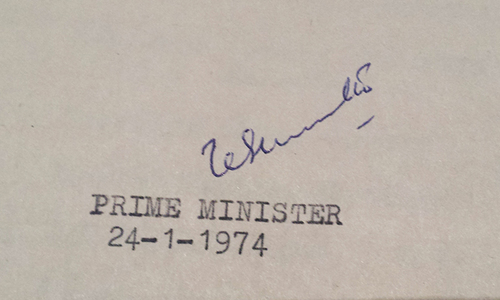FORTY years after his execution, Zulfikar Ali Bhutto — though a controversial figure for many — remains a potent symbol of resistance and an example in popular leadership.
Several Pakistani politicians are seen to be attempting his style of populist politics, just as work progresses on projects carrying the Bhutto tag.
The country continues its experiments with democracy, and Mr Bhutto’s consensus Constitution — now in an amended form with several changes hitting at the very soul of the document — is fighting to build upon its promise of empowering the people.
Another of Mr Bhutto’s major legacies, the PPP, though confined largely to Sindh, claims to be leading the struggle against anyone who might want to snatch the rights given to the provinces by the 18th Amendment.
At the national level, the PPP is striving to rediscover the magic ZAB formula that catapulted an idealistic set of people to the status of power holders a few years after the party was formed.
The anti-India sentiment may still be considered a plus for politics, but much else has faded away. The feel-good socialism the founder of the PPP invoked, even if more out of necessity than conviction, is fighting its own battle for survival.
Similarly, the pan-Islamism that Muslim leaders of the era championed is absent from the current discourse. The Bhutto family itself has gone through a tragic journey since the Rawalpindi hanging of April 4, 1979. Even after four decades, the sham trial which sought to paint the popular leader as a murderer has not quite seen its logical conclusion.
Those who have been in power, including PPP governments, have failed to bring closure to the case that sent Mr Bhutto to the gallows. The case of the assassination of Benazir Bhutto, too, some three decades after her father’s death, remains unsolved.
Unfortunately, the PPP, despite waging a difficult struggle through years of outright and quasi-dictatorship, has yet to build upon that promise of hope enunciated so many years ago.
It continues to use the good name of its ‘martyrs’ to try and curry favour with the people — a strategy that has met with little success in provinces other than Sindh, though the party remains a significant force in national politics.
Tainted by allegations of corruption and misgovernance, and often accused of toeing the establishment line because of political compulsions, there is a need for introspection and corrective action to regain lost ground.
It would be a death blow to the vision of its founder if the party were to swerve to the right or not do justice by the people in whose name it was created.
Published in Dawn, April 4th, 2019













































